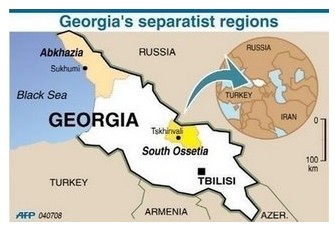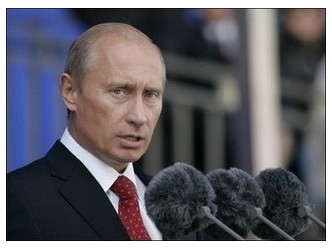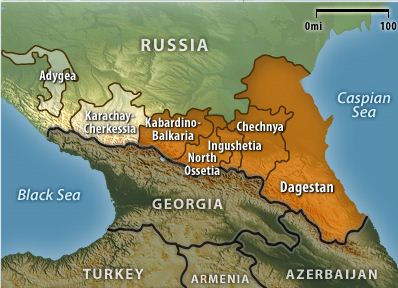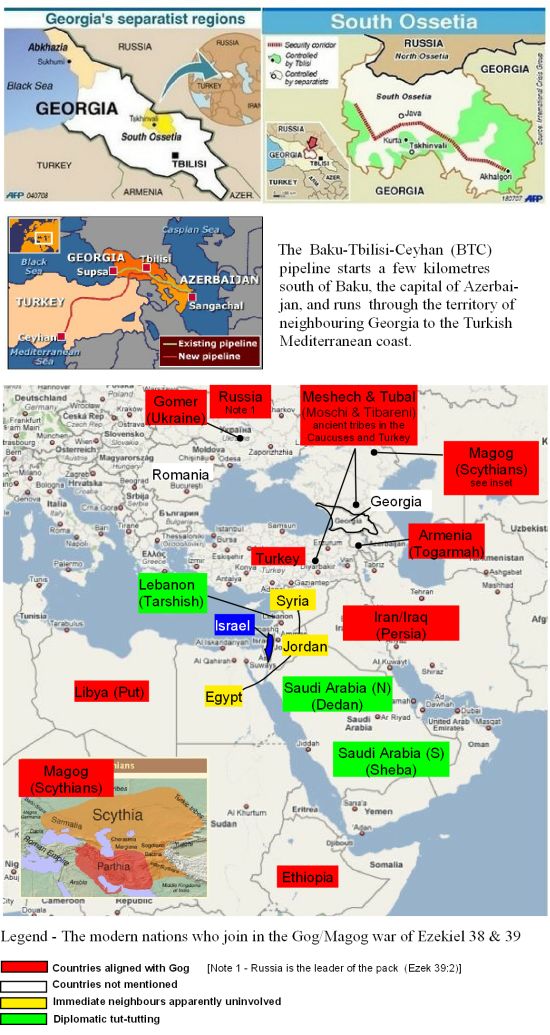|
James Bond, Putin and Ezekiel
coming into a coincidence
The Word of God prophesies an event – still future – wheverby a coalition of nations will mount a combined military attack on Israel. Geo-political developments in the region need to viewed through the lens of Ezekiel's forecast.
first published 27/08/08
See 'Responses' at foot of article for most recent update.

An astute observer of the geo-political worldscene recently published a book which centred around the outworking of God's prophetic purposes in the Middle East. However, it was no sooner published than changing world events required a revision to take account of an evolving situation.
Yesterday the prolific author stated that version three was now necessary in response to Russia's move into the Caucusas region and the state of Georgia.
Whilst the author has a very keen mind and an excellent knowledge of the Bible, he (and so many commentators in his field) find that they cannot keep up with the run of events in our modern world. Yet the writings of the prophets, penned two thousand five hundred years ago are as up-to-date as tomorrow's newspapers. This reflects the authenticity, inerrancy and timelessness of the Bible as the revealed Word of God.
 James Bond’s adventures have always been (loosely) related to current events; and back in 1999 the film The World is Not Enough centred around the super spy’s mission to protect a Caspian Sea oil pipeline running from Baku (Azerbaijan) through the Caucusas region to Turkey and the Mediterranean Sea. The story line revolved around a terrorist plot to sabotage the construction of the pipeline by sending a pilfered bomb attached to a welding rig into the pipeline headed toward the oil terminal. James Bond’s adventures have always been (loosely) related to current events; and back in 1999 the film The World is Not Enough centred around the super spy’s mission to protect a Caspian Sea oil pipeline running from Baku (Azerbaijan) through the Caucusas region to Turkey and the Mediterranean Sea. The story line revolved around a terrorist plot to sabotage the construction of the pipeline by sending a pilfered bomb attached to a welding rig into the pipeline headed toward the oil terminal.
Of course Bond succeeded in thwarting the evil plan and so today this Baku-Tbilisi-Ceyhan (BTC) pipeline is a vital route for oil supplies from the Caspian Sea to the West.
 But there is more strategic importance to the region than that. Russia — especially since the collapse of the USSR, the re-alignment of former soviet satellite states and the eastward expansion of the EU and NATO — is increasingly boxed in. There is no route west, and China sits to the east. But there is more strategic importance to the region than that. Russia — especially since the collapse of the USSR, the re-alignment of former soviet satellite states and the eastward expansion of the EU and NATO — is increasingly boxed in. There is no route west, and China sits to the east.
So the only ‘exit’ is to the south – via the Caucusas. Thus Georgia is the critical gateway and only ‘exit’ through which Russia must pass in any expansionary forays into the critical area of the Middle East. By controlling Georgia, Russia would secure both a vital military route and also a strangle hold on vital oil pipelines feeding the West.
Caucasus
 And Ezekiel? And Ezekiel?
If the past is anything to go by, Russia’s incursion into Georgia will result in a flood of messages from (mainly trans-Atlantic) leaders who will be (again) strongly advising that we are on the brink of seeing Ezekiel's prophecy concerning the Gog and Magog war (Ezek. 38 and 39) come to pass.
And it has to be said that there are very good reasons to think this, as the prophesy describes an end-time multi-national assault on Israel led by a land from ‘the far north’ (of Israel).
The leader of the pack is most certainly modern-day Russia, whose leader (the prince of ‘Rosh’ – Ezek. 38:2) has rallied a conglomerate of belligerents around him. These include (in modern-day terms) Iran, Libya, Ethiopia, Turkey, Armenia and some others besides (Ezek 38:5,6) (See also map below).
Ezekiel
 The two relevant chapters (Ezek 38 & 39) provide a graphic description of what today we would recognize as a nuclear, biological or chemical (NBC) attack on Israel which goes disastrously wrong for the aggressors (38:21,22; 39:3-5). The two relevant chapters (Ezek 38 & 39) provide a graphic description of what today we would recognize as a nuclear, biological or chemical (NBC) attack on Israel which goes disastrously wrong for the aggressors (38:21,22; 39:3-5).
The attack itself (38:8,9) is pre-ordained by God (38:10) to lead the Russian leader against his will (38:4) to his destruction (38:18-22; 39:3-5). Saudi Arabia, Lebanon, the United Arab Emirates and others will diplomatically ‘tut-tut’ (38:13), but no-one will take any action.
God has pre-ordained this major episode in world history so that through the defeat of Israel’s arch-enemies He will get the glory (Ezek 36:22; 39:7a), and the world will know that it has been the work of the God (39:7b). And through it all, Israel will come to recognize the Lord (39:28) through His ingathering and protection of them, and His new sight to their eyes (39:27-29).
But not yet!
However, although we might be seeing the prelude to this prophetic enactment, the time is not yet. And it is regarding this point that so many Bible prognosticators seem to be blind.
In the outworking of God's purposes it is not just the 'what', but also the 'when'.
The time of the outworking of the vision given through Ezekiel is following a time, for Israel, of sustained peace and prosperity: the country and the people will be enjoying a reassurance, suffering a complacency even, regarding their safety and security.
Today, Israel couldn’t be further away from being a people "living securely, all of them” (38:8b) or a “land of unwalled villages” (38:11). The country is guarded by a high security wall and checkpoints everywhere; and lives under daily fear of rocket attacks from Gaza, terrorist incursions, suicide bombers and an implacable enemy in Iran which is working rapidly towards a strategic nuclear capability.
It is interesting to note that in the list of the aggressor nations which Ezekiel lists in his prophecy, there is no mention of three of the four countries adjoining Israel's borders. Lebanon joins in with the diplomatic mutterings from the international community (38:13), but Egypt, Jordan and Syria are not mentioned at all. Of these three, Jordan is by far the friendliest towards its neighbour Israel. And regarding the other two— Syria and Egypt —there are related and interesting prophesies awaiting their fulfillment which speak of reconciliation with Israel. Isaiah foretells the destruction of Damascus (Is 17:1) (see footnote) and upheavals in Egypt (Is 19:1-17) which will bring restoration (with Israel and the Lord) and great blessing:
"In that day Israel will be the third, along with Egypt and Assyria, a blessing on the earth.The LORD Almighty will bless them, saying, "Blessed be Egypt my people, Assyria my handiwork, and Israel my inheritance." (Is 19:24-25)
Though the time for Ezekiel’s prophesy is not quite yet, the pieces of the jigsaw might be now coming into place. It will happen: God has declared it so. But first we need the (false) peace which will cause Israel to lower her defences. Humanly speaking things are a long way from that.
God has revealed his purposes to us (Amos 3:7); our part is to have our hearts and minds in tune.
The disciples on the road to Damascus were rebuked for their ignorance and attitute (Luke 24:25; Heb 4:12-13) ; let us avoid their mistake by knowing His word, and understanding the times in which we live. Peter, at the time of Pentecost looked around him and, with God-given revelation and inspiration exclaimed: "This is that spoken of by the prophet" (Acts 2:16). We live in "this is that" days.

Footnote:
Although Assyria and Damascus were overrun by Tiglath-Pileser III, Damascus is listed as the second-oldest continuously-inhabited cities in world history.
|
Christians Together, 03/06/2010
|
(page
1
2)
| |
|
Editor |
08/11/2009 16:47 |
Turkey backs Iran's 'right' to nukes
http://www.wnd.com/index.php?fa=PAGE.view&pageId=114999
Turkey and Russia on the rise
http://www.stratfor.com/weekly/20090317_turkey_and_russia_rise
|
| |
|
Editor |
14/04/2010 11:28 |
Back-channel news suggests that the present political upheaval (revolution) in Kyrgyzstan has been 'sponsored' and supported by Russia.
Although a long way from existing Russian borders the country is in a key position regarding influence and presence in the region.
There are a few reasons why Russia would want to re-install its presence in Kyrgyzstan -
1. To regain some of what was lost when the USSR collapsed
2. To 'seize the moment' when the US is still embroiled in Afghanistan
3. To undermine the US prescence (read 'strategic and vital air-base) in the country
A BBC report says:
>>>>
Kyrgyzstan's location means it is firmly entrenched in the new "great game" tussle between the US, Russia and China for power, influence and access to resources in the region.
US Manas airbase, Kyrgyzstan
The Manas base is critical to US action in Afghanistan
It hosts airbases for both Russia and the US, both of whom were quick to urge restraint.
The US base at Manas is vital as a staging post for its operations in Afghanistan. When Mr Bakiyev announced he was closing the base in early 2009 - following a significant aid pledge from Moscow - President Barack Obama agreed to a massive increase in rent payments.
The US lease on the base is due to expire in July 2010.
The interim minister for constitutional affairs has suggested its days could be numbered but Ms Otunbayeva has said she will honour the current agreement.
Washington has responded cautiously, saying it has an "existing agreement" with Bishkek and that it does not believe the uprising was "anti-American" or Russian-sponsored. It is sending a delegate to meet the new administration.
See - http://news.bbc.co.uk/1/hi/world/asia-pacific/8608870.stm
<<<
Couple this with very similar moves (create unrest to destabilise and then seize control) over the past couple of years to regain control in the Caucusus (e.g. note on Georgia above) and the Ukraine what we are seeing is a re-emergence of the Russian bear from a period of 'wound-licking', humiliation and vulnerability.
|
| |
|
Editor |
03/06/2010 16:01 |
The attempt to breach the restrictions placed on shipments into Gaza was no 'mercy mission'. It was a deliberate attempt to pave the way for covert shipment of arms into the region. However the real significance and lasting importance relating to the incident is Turkey's deliberate and calculated involvement.
Over the last 12 months Turkey has shown itself to have 'turned East' in its sympathies and relationships. Last year the country pulled out of a planned joint military exercise with the US and Israel and alternatively joined in with Russia in war games.
In acting recently as it has, Turkey is aiming to supplant Egypt as the main player with the rest of the Arab world. The Turkish involvement and reaction puts Egypt on the back foot in terms of anti-Israelism, and Egypt might well respond - in order to re-establish its credentials in the Arab world - by opening Gaza's southern border with Egypt. This would then allow Hamas to renew its shipment of arms via this (Egypt/Gaza) route.
With reference to the Gaza ship incident, Turkey's President Abdullah Gus is reported as saying relations between the two countries would "never be the same". He stated: "This incident has left an irreparable and deep scar."
Read on...
http://news.bbc.co.uk/1/hi/world/middle_east/10226151.stm
See also the map in the main article above and also
http://www.stratfor.com/weekly/20090317_turkey_and_russia_rise
The net result of all of this is that Israel could be left with Turkey and Egypt as hostile neighbours to the north and the south respectively. Couple this to Syria and Iran and it creates a very dangerous situation.
Joel C. Rosenberg who is a respected analyst and author has commented: "There is growing interest in the Ezekiel prophecies and whether they could play out in our lifetime. I believe it is still too early to say anything definitively. But I agree that current events are strikingly consistent with the prophecies and I believe it is possible that we could see these events unfold soon. The mention of "Gomer" in Ezekiel, for example, refers to the modern-day State of Turkey which will be an enemy of Israel and part of a Russian-Iranian alliance against the Jewish state. I'm not saying the prophecy will necessarily come to pass soon, but I can't rule out that possibility. We've never seen a convergence of geopolitical and spiritual events so consistent with Ezekiel 38-39 in history like we are seeing today. We need to be prayerful, sober, alert and prepared.
Regarding the ongoing conflict in the region, Israel's president Benyamin Netanyahu has said: "If the Arabs put down their weapons today, there would be no more violence. If the Jews put down their weapons today, there would be no more Israel."
|
| |
|
Editor |
07/07/2010 19:21 |
"Of all the regions of the world, this one is among the most potentially explosive. It is the most likely to draw in major powers and the most likely to involve the United States. It is quiet now — but like the Balkans in 1990, quiet does not necessarily reassure any of the players. Therefore, seven players are involved in a very small space. Think of it as a cauldron framed by Russia, Iran and Turkey, occasionally stirred by Washington, for whom each of the other three major powers poses special challenges of varying degrees."
See report from Stratfor on the importance of the Caucusus - http://tinyurl.com/33nalze
|
| |
|
Editor |
19/08/2010 15:21 |
By Ben West and Lauren Goodrich
On Aug. 12, four members of the militant group the Caucasus Emirate (CE) appeared in a video posted on a Russian militant website withdrawing their support from CE founder and leader Doku Umarov. The reason for the mutiny was Umarov’s Aug. 4 retraction of his Aug. 1 announcement that he was stepping down from the top leadership position. STRATFOR and many others noted at the time that the Aug. 1 resignation was unexpected and suggested that Umarov may have been killed. However, the Aug. 4 retraction revealed that Umarov was still alive and that there was considerable confusion over who was in control of the militant group.
The mutineers were all high-level members of the militant group: Hussein Gakayev, commander of the CE’s Chechen forces; Aslambek Vadalov, commander of Dagestani forces and to whom Umarov had briefly turned over control in his Aug. 1 resignation; an Arab commander named Muhannad; and a veteran field commander known as Tarkhan. The four CE commanders said Umarov’s renunciation showed disrespect for his subordinates and that, while the four leaders continued to pledge support to the CE, they no longer supported Umarov. Gakayev, Tarkhan and Muhannad had all appeared in a video that aired Aug. 1 in which they supported Umarov’s decision to appoint Vadalov CE emir.
To further confuse the issue, a video released Aug. 11 by Emir Adam, the CE leader in Ingushetia, pledged his and his followers’ loyalty to Umarov. The next day, another video appeared featuring the group’s new leader in Dagestan, Emir Seyfullakh Gubdensky (who succeeded Vadalov after he became deputy leader of the CE), similarly endorsing Umarov’s reclamation of the top CE post.
These disparate messages from top leaders paint a picture of confusion and dissension in the CE that appears to mark a serious crisis for a group, which, until recently, had been consolidating militant groups across the Caucasus under a single, more strategic leadership structure. STRATFOR has collected insight from sources familiar with the group and its leadership turmoil that explains what happened and the nature of the threat that the CE poses to Russian security in the Caucasus.
The Inside Story
According to a Russian source, the confusion caused by Umarov’s apparent indecision over the CE leadership position was a deliberate operation by Russia’s Federal Security Service (FSB). According to that source, the operation that ultimately appears to have undermined Umarov’s position as leader of the CE began in early 2010. However, the FSB received intelligence only over the past two months that set the stage for executing the operation. That intelligence allegedly came from the CE’s former leader in Ingushetia, Emir Ali Taziyev, who was arrested by the FSB on June 9 in an Ingushetian village. Taziyev allegedly provided the FSB information on the CE’s training, ideology, weapons procurement and leadership structure. This information then allowed the FSB to activate a sleeper agent, Movladi Udugov, who served directly under Umarov as the CE’s head of media and publicity. According to our source, Udugov was responsible for the unauthorized release of the video in which Umarov announced that he was stepping down and named Vadalov as his successor.
The story goes that Umarov had recorded the video with the intent of saving it and releasing it only in the event of his demise. This would ensure that a crisis of succession wouldn’t erupt because of his death or disappearance. The fact that Vadalov was named as his successor on July 25 means that each of the regional leaders within the CE had likely agreed to the decision. It is important to note that the leadership crisis did not occur because Vadalov was assigned to the post, but because Umarov appeared to have stepped down and then reclaimed his title. Udugov provided the crucial blow to Umarov’s status as leader of the CE by releasing the resignation video prematurely, laying the foundation for dissension among Umarov’s followers.
The resulting flurry of approval and disapproval from the CE’s corps of commanders shows just how damaging the videos were. We have to be critical of the Russian source’s account of how all of this transpired, since the source is likely interested in promoting the FSB’s capabilities and its penetration of Russia’s most dangerous militant group. The account is logical, however, since it does explain the unusual sequence of videos, and the FSB is capable of infiltrating such a group. There are, of course, other explanations for what could have motivated Udugov to release the tape: Perhaps he was trying to trigger a power struggle within the group on his own, or perhaps someone else inside the CE obtained the tape and released it in hopes of weakening Umarov or promoting Vadalov. However, it is very unlikely that the release was a mistake, since Umarov and his commanders have proved very competent at running a successful militant movement.
Looking deeper, it becomes obvious that a video alone would not have caused dissension on the scale that we are seeing now within the CE. Had everything been perfect in the CE and had Umarov enjoyed unwavering support, he could have dismissed the video as an attempt to undermine his authority, promised to punish those responsible and gone on with business. It is very apparent that Umarov was not able to do this. The release of the videos exacerbated divisions among CE factions that Umarov and his deputies were trying to consolidate. By releasing the video of Umarov stepping down as commander, Udugov (allegedly under FSB guidance) forced the divisions into the public spotlight.
According to our Russian source, the resignation scandal has split the CE three ways. The first split concerns operational security. The CE knew that penetrating the group was a top priority for the FSB and that it had to remain vigilant against outsiders attempting to do just that. Simply the allegation that one of Umarov’s top advisers was working for the FSB undermines the sense of operational security throughout the entire group. Already, accusations of FSB involvement in the CE leadership crisis have emerged in the open-source network, on sites like globaljihad.net. In such an atmosphere, the level of trust among commanders decreases (as they begin to wonder who is reporting to the FSB) and the level of paranoia increases. Infighting at the top of any organization can quickly create operational gridlock and reduce the organization’s effectiveness. This is exactly why the Russians might try to claim credit for the tape’s release, even if they were not responsible.
The second split is generational and ideological. According to our source, a younger faction of the CE (led by Vadalov) has accused Umarov and his cadre of not protecting the ideological unity of the CE. It is no secret that Umarov is much more experienced in and knowledgeable of military strategy and tactics, while his background in Islamism is weak. He has bungled religious protocol and terminology a number of times, undermining his authority as emir of the group. Meanwhile, the older, more military-oriented faction accuses the younger faction of being willing to work with Moscow and sell out the movement.
Power Struggle Among Russia's Militants
The third and possibly most volatile fault line is the tension between regional groups within the Caucasus Emirate. The northern Caucasus republics of Kabardino-Balkaria, North Ossetia, Ingushetia, Chechnya and Dagestan each have their own, independent histories of militancy, with Chechen militants traditionally being Moscow’s highest-profile antagonists. Without the support of the Chechen commander of the CE (Khusein Gakayev, who withdrew his support for Umarov in the Aug. 12 video), Umarov has a serious deficit of support in controlling the Caucasus Emirate. The advantage of having the support of the current Ingushetian and Dagestani militant leaders is diluted by the fact that Chechnya geographically lies directly between them, rendering any trans-Caucasus network incomplete. Also, Chechens have been the more successful leaders of militant movements in the Caucasus. Umarov himself is Chechen, as was Shamil Basayev, a commander of Chechen separatist forces in two wars against Russia.
Threat and Inherent Weaknesses
It is exactly because of Doku Umarov’s ability to bring together militants of different motivations, generations and locations under the umbrella of the Caucasus Emirate that made his group so threatening to the Russian state. As a unified militant group, the CE proved capable of launching a suicide attack against Moscow’s subway system in March 2010 and carrying out relatively sophisticated attacks targeting security forces and infrastructure. The CE leadership structure provided strategic guidance to the individual militant groups operating in the separate republics that actually carried out the attacks. With the recent crisis in leadership, these capabilities will likely be severely weakened.
Umarov announced the formation of the CE only in 2007, which means the group was just three years old when the leadership turmoil broke out Aug. 1. This is precious little time to consolidate militant groups across a region with sharp geographic fragmentation that traditionally has caused groups to be isolated and independent. Moscow has had plenty of problems controlling the region and is faced with the same geographic challenges as the Caucasus Emirate. A different source familiar with the CE said that Umarov has most recently attempted to consolidate the CE by broadcasting his statements in different languages, such as Avar, which is widely spoken in Dagestan. But Avar is only one of 10 languages spoken across Dagestan alone, which makes communicating efficiently to an audience across the Caucasus a difficult task.
That same source has said that the CE has had trouble moving food, supplies, weapons and people across the Caucasus (this effort is complicated by Russian security forces as well as geography), which means that each group is responsible for providing for itself. This prevents standardization across the militant movement and complicates cooperation among groups. It also reduces the reliance of regional militant groups on the Caucasus Emirate leadership, decreasing Umarov’s control over the movement. If militant commanders in Chechnya are supplying and recruiting on their own, they are less likely to take orders on what to do with those resources from detached leaders. However, lack of unity among the groups does not necessarily make them less able to carry out the small-scale attacks that are common in the Caucasus. On Aug. 17, five days after a split in the CE leadership became apparent, a suicide bomber (most likely affiliated with a group linked to the CE) attacked a police checkpoint along the border of Ingushetia and North Ossetia.
Militant groups existed in the Caucasus long before the Caucasus Emirate was formed and will continue to exist long after it is gone. The strategic importance of the Caucasus and the fragmentation of its inhabitants due to ethnicity, culture and geography (which makes for ideal guerrilla-warfare terrain), ensure that whoever attempts to control the region will face serious challenges from local populations who want to govern themselves. With varying levels of success, these groups will continue to use violence to undermine their respective governments, especially those seen as Moscow’s lackeys.
Indeed, even though the Caucasus Emirate may be seriously disrupted by recent turmoil in its leadership structure, the regional militant groups that made up the CE will certainly continue to conduct attacks against security forces and even civilians as they try to loosen Moscow’s control over the region. But the turmoil will reduce the strategic threat the combined efforts of these disparate groups had posed to Moscow for the foreseeable future.
Read more: Power Struggle Among Russia's Militants | STRATFOR
http://www.stratfor.com/weekly/20100818_power_struggle_among_russias_militants">Power Struggle Among Russia's Militants is republished with permission of STRATFOR.
|
| |
|
Joel Rosenberg (Joshua Fund) (Guest) |
30/12/2010 15:11 |
(Denver, Colorado, December 30, 2010) -- If you've been tracking the historic discoveries of natural gas and oil in Israel in recent years -- and the intriguing connection of these discoveries to ancient Bible prophecy -- then you will likely be interested in this week's headlines:
* Wall Street Journal: BIG GAS FIND SPARKS A FRENZY IN ISRAEL
* Haaretz: Largest natural gas reserve discovered in Israel worth approximately $95 billion - More than 16 trillion cubic feet of natural gas discovered off Haifa shore in joint U.S.-Israeli drilling operation
* Agence France Presse: Israel has enough gas 'to become exporter'
In my first non-fiction book, "Epicenter," published in 2006, I included a chapter entitled, "Future Headline: Israel Discovers Massive Reserves of Oil, Gas." The chapter described a trail of prophetic clues found in the Hebrew Scriptures that some believe (myself included) indicate that in the "last days" the nation of Israel will be blessed by discovering huge reserves of petroleum that will make Israel quite wealthy.
Those clues suggest Israel will be able to "dip his foot in oil" and draw "oil from the flinty rock." The Jewish people will find "hidden treasures in the sand" and an "abundance of the seas."
This newfound wealth in the last days will certainly be a blessing for Israel, but it will also draw enemies and may very well help trigger the "War of Gog and Magog" when the nations ask the leaders of the Russian-Iranian alliance that comes against the Jewish state, "Have you come to capture spoil [from Israel]? Have you assembled your [military forces] to seize plunder, to carry away silver and gold….to capture a great spoil?"
The trail of clues can be found in the following Bible verses [you link directly to the verses cited on on my blog]:
*Genesis 49:1
*Genesis 49:25
*Deuteronomy 33:13
*Deuteronomy 33:19
*Deuteronomy 33:24
*Deuteronomy 32:12-13
*Isaiah 45:3
*Ezekiel 38:8-13
Are such prophecies now coming to pass? Are such headlines further evidence that we are living in the "last days" before the return of our Lord Jesus Christ? It's a story worth keeping an eye on, to be sure.
|
| |
|
Editor |
17/05/2011 19:17 |
In the face of perceived threats and geo-political changes a group of four central-European nations have formed a new military grouping independent of NATO and the EU.
See - http://www.christianstogether.net/Publisher/Article.aspx?id=261125
|
| |
|
Editor |
10/12/2012 17:41 |
RUSSIAN LAND-BRIDGE REOPENS
Following the severance of relationships with Russia in 2008 the new government in Georgia has stated that it intends to set up (re-establish) normal relations with Russia.
http://english.ruvr.ru/2012_12_10/Georgia-intends-to-set-up-normal-relations-with-Russia-Deputy-PM/
In 2008 and as a response to Russia's recognition of Abkhazia and South Ossetia, the Georgian government announced that the country cut all diplomatic relations with Russia.Russia had already closed its embassy right after the beginning of the war in South Ossetia (in August 2008: see maps in main article) before diplomatic relations between the two countries ended.
Georgia straddles the Russia's land bridge into the Middle East.
|
| |
|
Editor |
05/03/2014 16:42 |
Ukraine is Gomer of Ezekiel 38:6
|
| |
|
Editor |
13/10/2015 14:23 |
MAJOR OIL DISCOVERY IN THE GOLAN
Major reserves of oil have been discovered on the Golan Heights, which could make Israel self-sufficient for many years to come, according to drilling company Afek Oil and Gas.
The company, which began round-the-clock drilling in the Golan Heights in December last year, found large reserves of oil at three drilling sites in the south of the region.
"We are talking about a layer which is 350 meters thick," Dr. Yuval Bartov, the chief geologist of Afek Oil and Gas told Channel 2 News.
"On average in the world strata are 20-30 meters thick, so this is 10 times as large as that, so we are talking about significant quantities."
Read on..
http://www.breakingchristiannews.com/articles/display_art.html?ID=16836
|
(page
1
2)
|
|
|